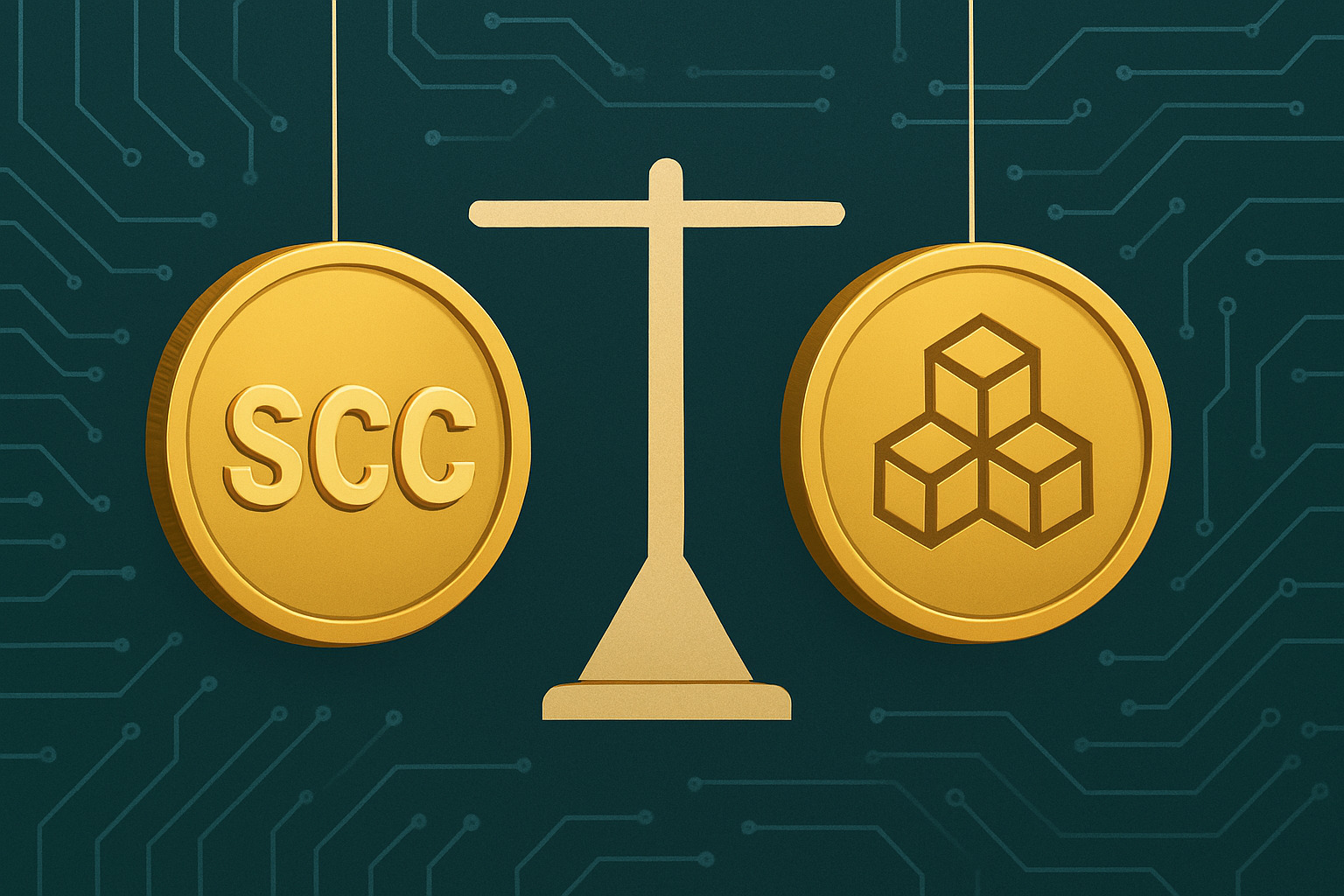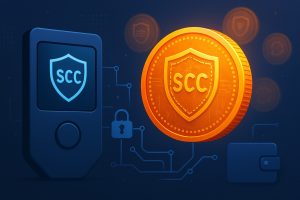
Blockchain tokens are everywhere, but not all of them are built the same. Some promise fast transactions, others focus on security, and a few aim to balance both. SCC stands among them with its own advantages and trade-offs. But how does it actually measure up against other tokens?
Looking at the bigger picture, the real question isn’t just whether SCC is “better” or “worse.” The real question is: Where does SCC outperform, and where does it fall short compared to other tokens? That’s what this breakdown will cover.
Speed and Scalability
The speed of a blockchain token isn’t just about how fast a transaction goes through—it’s about how well it handles growth without slowing down.
SCC’s Approach
SCC is designed to process transactions quickly with minimal congestion. This is key for users who need efficiency, especially in DeFi and real-world applications.
How Other Tokens Compare
- Some blockchain tokens like Solana prioritize raw speed, handling thousands of transactions per second but sometimes at the cost of decentralization.
- Ethereum, despite its size, has struggled with congestion, though upgrades like sharding aim to fix this.
- Bitcoin remains slow and expensive, prioritizing security over speed.
Where SCC Wins: Faster and more efficient than older blockchains struggling with congestion.
Where SCC Loses: May not match the extreme speeds of centralized blockchain solutions.
Security and Decentralization
Security means keeping transactions safe from attacks, while decentralization ensures that no single entity controls the network.
SCC’s Security Measures
SCC balances both, using encryption and smart contract audits to reduce vulnerabilities. It also avoids over-centralization, preventing control from being in the hands of a few.
Strengths and Weaknesses of Other Tokens
- Bitcoin is the gold standard in security, with its proof-of-work model making it nearly impossible to hack. But it comes at the cost of slow transactions and high fees.
- Ethereum has had its share of smart contract hacks, exposing weaknesses in decentralized applications.
- Centralized tokens like Ripple (XRP) rely on a more controlled system, making them faster but less decentralized.
Where SCC Wins: More balanced than fully centralized tokens and less prone to smart contract vulnerabilities than some blockchains.
Where SCC Loses: May not match Bitcoin’s near-impenetrable security or the speed of centralized models.
Transaction Costs
Fees matter, especially for users making frequent transactions. High fees can make a token less practical, even if it offers other advantages.
SCC’s Cost Structure
SCC keeps fees low, making it appealing for both small and large transactions. The goal is affordability without sacrificing security.
How Other Tokens Stack Up
- Bitcoin and Ethereum can have notoriously high fees, especially when networks are congested.
- Low-fee blockchains like Binance Smart Chain (BSC) have made transactions cheaper but sometimes at the cost of decentralization.
- Some newer tokens are even exploring zero-fee models, but these often rely on alternative revenue streams or trade-offs in security.
Where SCC Wins: More affordable than major blockchains struggling with gas fees.
Where SCC Loses: Some tokens with highly optimized fee structures may offer even lower costs.
Smart Contract Functionality
Smart contracts power everything from DeFi to NFTs. A strong smart contract system means fewer limitations for developers and users.
SCC’s Smart Contract Capabilities
SCC supports smart contracts, allowing for complex applications without excessive costs or slow execution times.
Smart Contract Capabilities of Other Tokens
- Ethereum remains the leader, offering the largest ecosystem of smart contract applications. But it’s expensive.
- Solana and Avalanche provide faster and cheaper alternatives but have faced network stability issues.
- Cardano focuses on a research-driven approach but has been slower in adoption.
Where SCC Wins: Efficient and cost-effective, making it a solid choice for developers looking for flexibility without high costs.
Where SCC Loses: May not have the same developer adoption as Ethereum or the extreme speed of some newer blockchains.
Adoption and Real-World Use
A blockchain token’s value depends on how widely it’s accepted. If no one is using it, even the best technology means nothing.
SCC’s Adoption
SCC is gaining traction, with businesses and platforms starting to integrate it for various applications.
How Other Tokens Are Used
- Bitcoin is mainly a store of value, with limited real-world spending use.
- Ethereum dominates DeFi, with a vast network of projects built on it.
- Stablecoins like USDT and USDC are more commonly used for real-world transactions because of their stable value.
- Some blockchain tokens focus on niche industries, such as gaming (Enjin) or supply chain tracking (VeChain).
Where SCC Wins: Shows strong potential for adoption in multiple industries.
Where SCC Loses: May not yet have the massive ecosystem of major players like Ethereum or the name recognition of Bitcoin.
Community and Development
A blockchain’s success isn’t just about its technology—it’s about the people behind it. A strong developer and user community drives innovation and growth.
SCC’s Community
SCC has an active and growing community, with ongoing improvements based on feedback and participation.
How Other Blockchains Compare
- Bitcoin and Ethereum have the largest communities, ensuring long-term support and development.
- Smaller blockchain projects struggle if they don’t attract enough developers or users.
- Some projects rely on corporate backing, like Ripple, but this can lead to trust issues among decentralized enthusiasts.
Where SCC Wins: Engaged community that influences its direction.
Where SCC Loses: Competing against the giants of the industry in terms of size and global reach.
Environmental Impact
Energy efficiency is becoming a bigger concern, with some blockchains criticized for their energy consumption.
SCC’s Energy Usage
SCC focuses on efficiency, avoiding the excessive energy consumption seen in proof-of-work models.
The Environmental Costs of Other Blockchains
- Bitcoin is one of the worst offenders, consuming as much energy as entire countries.
- Ethereum is improving with its shift to proof-of-stake, cutting energy use significantly.
- Newer blockchains are often built with sustainability in mind, reducing their environmental footprint.
Where SCC Wins: More efficient than older, energy-heavy blockchains.
Where SCC Loses: Some next-generation tokens may have even lower environmental impact.
Final Thoughts
No blockchain token is perfect. Every choice comes with trade-offs. SCC holds its ground with strong security, low fees, and growing adoption. It offers a balanced mix of speed and decentralization without the extreme downsides of some competitors.
That said, the biggest challenge for SCC is standing out in an industry dominated by giants. Ethereum leads in smart contracts. Bitcoin remains the gold standard for security. Some newer tokens push the limits of speed and affordability.
For those looking for an alternative that blends efficiency, security, and usability, SCC is a strong contender. But like any blockchain token, its success will depend on continued adoption and real-world use.




